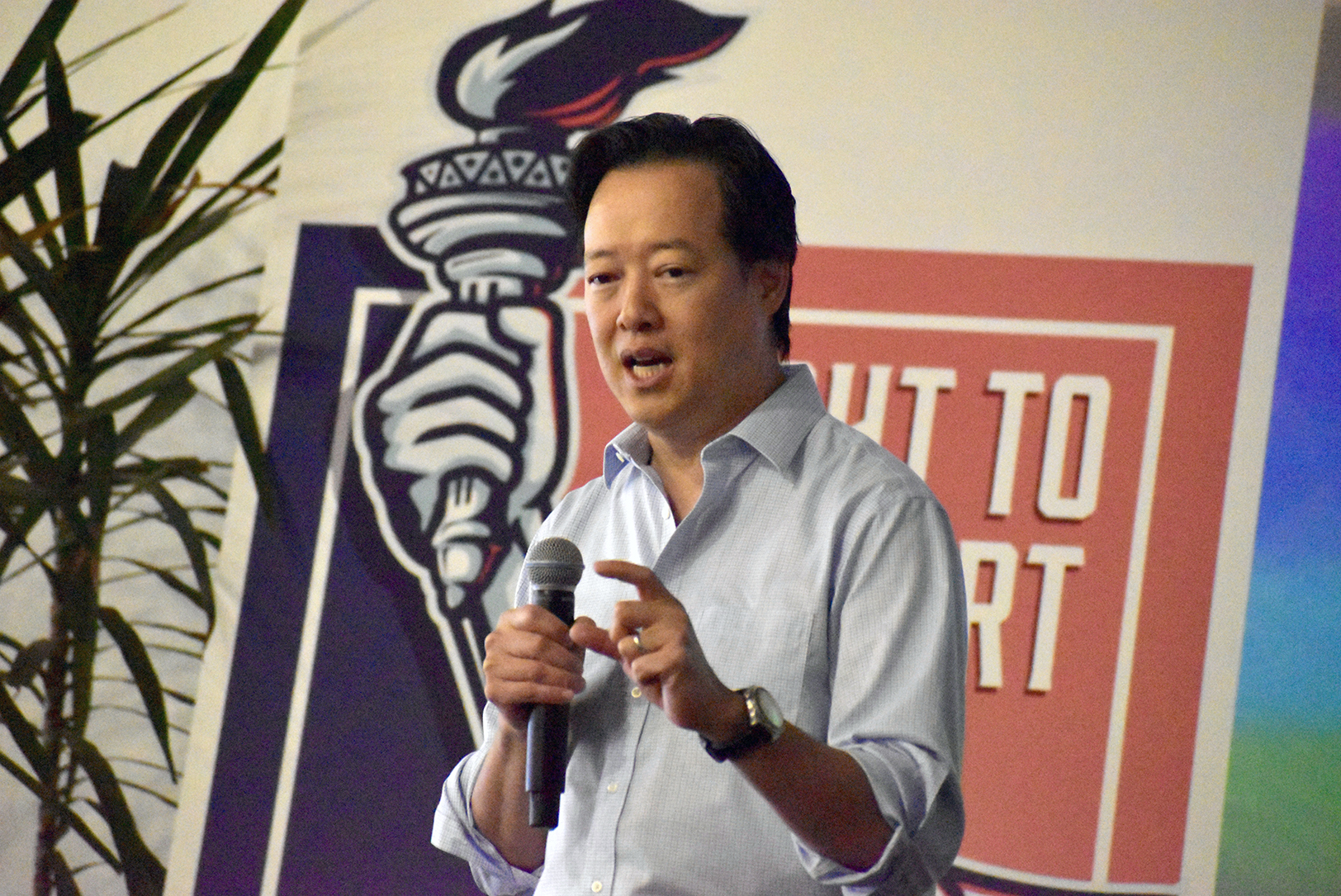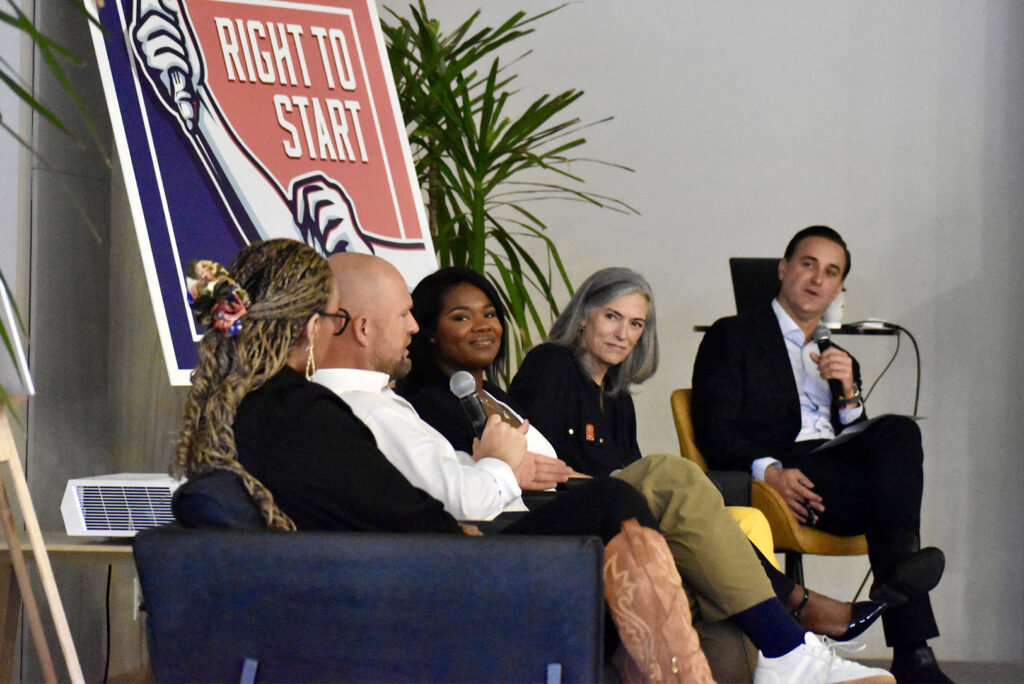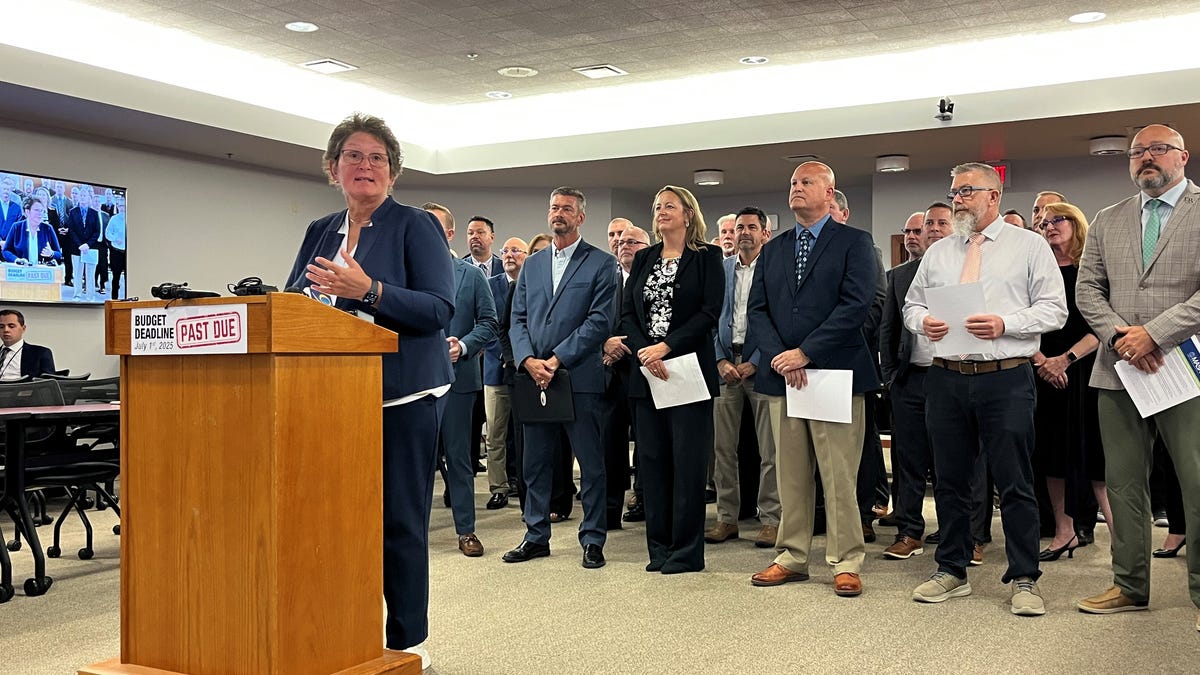Perhaps Josh said it best in his 5 takeaways, the Missouri Tigers 52-10 win over Louisiana was an exercise in ‘taking care of business’.
Missouri
Missouri cannabis workers fight to unionize

Sean Shannon, lead organizer with the United Food and Commercial Workers International Union Local 655 (left), and former budtender-turned-organizer Danny Foster visited several marijuana dispensaries in eastern Missouri in November to talk to employees about unionizing. | Rebecca Rivas/Missouri Independent
ST. LOUIS—The first day was a breeze.
While Missouri cannabis dispensary workers see progress, marijuana manufacturing employees say they are stuck in a ‘gray area,’ unable to unionize because they may be considered agricultural workers.
Or so Sean Shannon and Danny Foster found out when they walked into several marijuana dispensaries around Missouri with their matching “Union For Cannabis Workers” shirts and talked to employees about the possibility of unionizing.
“The first day, there were 57 stops amongst the teams,” said Shannon, lead organizer for United Food and Commercial Workers Local 655. “Reception was out-of-this-world positive. Workers were so excited.”
Shannon had gathered together a dozen organizers to help Local 655 visit every one of the approximate 100 dispensaries on the eastern half of Missouri—twice.
Stirring up the excitement was the union’s big win of the recent settlement, where 10 Shangri-La South dispensary workers in Columbia received a collective $145,000 after being fired following a March union organizing drive.
“They were excited to hear that Shangri La [employees] actually won,” he said. “They couldn’t believe people were getting their jobs back. They couldn’t believe the amount of money.”
But by the third day, the reception got much colder, he said. Managers had warned their counterparts at other locations that union reps might be visiting.
“Employees were basically told, ‘If you talk to the union, if you take a card, if you take a sticker, you’re out,’” he said.
Still, since the tour, union activity has “blown up,” Shannon said.
An active campaign means the employees have signed agreements, or authorization cards, with the union authorizing Local 655 to represent them. It also means union leaders believe workers have a good shot at succeeding.
Shannon said Local 655 now has authorization to represent more than 20 locations in eastern Missouri.
The next step is filing a representation petition with the National Labor Relations Board, seeking to have the board conduct an election among employees on whether or not to unionize.
Last week, employees at Hi-Pointe Cannabis in St. Louis filed a petition—following the lead of workers at High Profile Dispensary in Columbia and Bloom Medical Dispensary in St. Louis in early November.
In October, Homestate Dispensary employees in Kansas City voted 6-1 to have Teamsters Local 955 represent them, becoming the second unionized dispensary in Missouri. The first was Root 66 Dispensary in St. Louis, where employees voted to join UFCW Local 655 in April 2022.
A big reason for unionizing
A big reason why employees are moving towards unions, Shannon said, is because Missouri is at the point where the “canna-bliss” of working with marijuana professionally is starting to wear off.
Now the reality that workers aren’t getting paid enough, are sometimes working in poor conditions and have no job stability is starting to set in, said Danny Foster, a former cannabis worker who was helping with the union’s tour.
“We really weren’t given the industry that we were promised,” Foster said. “We all came in super excited. We love cannabis. We wanted to be able to make it a career. But as it is right now, cannabis isn’t a career.”
The motivation to unionize for Andrew Nussbaum, the most veteran worker at Shangri-La South dispensary in Columbia, was to ensure job security. Because he loves his job as a patient consultant supervisor.
“A lot of us just want to help people and help them find something that works for them,” he said. “I’ve talked to people for 45 minutes to an hour to kind of get them squared away.”
When he and other dispensary workers filed an NLRB representation petition in April, they encountered strong resistance.
After the bosses fired Nussbaum and nine other employees, the board swiftly and firmly sided with them and approved a settlement that awards back pay to all the “unlawfully terminated employees.” It also cleared a path for them to unionize. Announcing the agreement, the board made a pointed statement about the case reflecting the “General Counsel’s vision of fully restorative relief.”
Nussbaum is among five of the 10 terminated employees who will return to work in the near future. And despite it being a tumultuous year, he said he’s committed to his role. He has a degree in plant biology, and he enjoys learning about how cannabis can help people.
“That’s what this is all about,” he said. “That’s why it’s so important to all of us, because this was not an easy ordeal for any of us.”
One of the things that draws people to the industry is the camaraderie among employees who are passionate about cannabis, Shannon said. And that’s also what makes it the perfect breeding ground for organizing.
“This is a tight-knit community that takes care of each other. They’re already learning that… having a union backing you up, it’s the only way to truly make a difference. I’ve been telling people, ‘Wait till you feel that contract high.’”
But are they ag workers? That’s the big barrier they confront.
A different kind of battle
Will Braddum, a post-harvest technician, faces a different kind of battle at BeLeaf Medical’s Sinse Cannabis site in St. Louis. Not long after he and 17 other employees filed their petition in September, the company argued before the board that the employees aren’t manufacturer workers—they’re agricultural workers.
Agricultural laborers aren’t protected under the National Labor Relations Act, which ensures employees have the “fundamental right to seek better working conditions and designation of representation without fear of retaliation.”
But in a concession to Southern segregationist senators whose votes FDR needed for the legislation, two big groups of workers were excluded, because of race: Farm workers, who were mostly Latino, and domestic workers, who were mostly Black.
It’s a frustrating “gray area” for manufacturing cannabis employees looking to unionize, Shannon said.
On Oct. 27, company representatives described the employees’ job descriptions to the board, which included “a whole bunch of the cultivation side’s job description,” Braddum said. It was eye-opening for the employees who testified and had to refute that description, he said.
“I’ve never watered anything and never touched any soil,” he said. “I’ve never touched a living plant at work. So I guess if they’re gonna tell the National Labor Relations Board that we’re doing agricultural work, maybe they’re not necessarily on our side at all.”
An attorney for BeLeaf Medical said the company was not able to comment.
It’s unclear how long a decision from the board will take, but the decision will likely be reviewed closely nationwide.
Braddum has been at BeLeaf for the last year and a half, but he’s been part of the legacy market since 2009.
“I just kind of segued,” he said. “I went from an illegal career to a legal career without a hiccup basically.”
For him, this is his career. He’s seen how “cutthroat” the corporate side can be and how a human relations officer has the power to make someone lose their agent ID, or state-issued license to work in cannabis. He doesn’t want that to happen to him or any of his team.
“The only way to pad myself from Human Resources is to cultivate a union movement,” he said, “and talk to my co-workers about job security.
Rebecca Rivas is a multimedia reporter who covers Missouri’s cannabis industry. A graduate of the University of Missouri School of Journalism, she has been reporting in Missouri since 2001, including more than a decade as senior reporter and video producer at the St. Louis American, the nation’s leading African-American newspaper.
We hope you appreciated this article. At People’s World, we believe news and information should be free and accessible to all, but we need your help. Our journalism is free of corporate influence and paywalls because we are totally reader-supported. Only you, our readers and supporters, make this possible. If you enjoy reading People’s World and the stories we bring you, please support our work by donating or becoming a monthly sustainer today. Thank you!

Missouri
Missouri woman sentenced to prison over scheme to sell Elvis Presley’s Graceland

A Missouri woman was sentenced on Tuesday to more than four years in federal prison for scheming to defraud Elvis Presley’s family by trying to auction off his Graceland home and property before a judge halted the brazen foreclosure sale.
US district judge John T Fowlkes Jr sentenced Lisa Jeanine Findley in federal court in Memphis to four years and nine months behind bars, plus an additional three years of probation. Findley, 54, declined to speak on her own behalf during the hearing.
Findley pleaded guilty in February to a charge of mail fraud related to the scheme. She also had been indicted on a charge of aggravated identity theft, but that charge was dropped as part of a plea agreement.
Findley, of Kimberling City, falsely claimed Presley’s daughter borrowed $3.8m from a bogus private lender and had pledged Graceland as collateral for the loan before her death in January 2023, prosecutors said when Findley was charged in August 2024. She then threatened to sell Graceland to the highest bidder if Presley’s family didn’t pay a $2.85m settlement, according to authorities.
Findley posed as three different people allegedly involved with the fake lender, fabricated loan documents and published a fraudulent foreclosure notice in a Memphis newspaper announcing the auction of Graceland in May 2024, prosecutors said. A judge stopped the sale after Presley’s granddaughter sued.
Experts were baffled by the attempt to sell off one of the most storied pieces of real estate in the country using names, emails and documents that were quickly suspected to be phony.
Graceland opened as a museum and tourist attraction in 1982 and draws hundreds of thousands of visitors each year. A large Presley-themed entertainment complex across the street from the museum is owned by Elvis Presley Enterprises. Presley died in August 1977 at the age of 42.
The public notice for the foreclosure sale of the 13-acre (5-hectare) estate said Promenade Trust, which controls the Graceland museum, owed $3.8m after failing to repay a 2018 loan. Actor Riley Keough, Presley’s granddaughter, inherited the trust and ownership of the home after the death of her mother, Lisa Marie Presley.
Keough filed a lawsuit claiming fraud, and a judge halted the proposed auction with an injunction. Naussany Investments and Private Lending – the bogus lender authorities say Findley created – said Lisa Marie Presley had used Graceland as collateral for the loan, according to the foreclosure sale notice. Keough’s lawsuit alleged that Naussany presented fraudulent documents regarding the loan in September 2023 and that Lisa Marie Presley never borrowed money from Naussany.
Kimberly Philbrick, the notary whose name is listed on Naussany’s documents, indicated she never met Lisa Marie Presley nor notarized any documents for her, according to the estate’s lawsuit. The judge said the notary’s affidavit brought into question the authenticity of the signature.
In halting the foreclosure sale, the judge said Elvis Presley’s estate could be successful in arguing that a company’s attempt to auction Graceland was fraudulent.
A statement emailed to the Associated Press after the judge stopped the sale said Naussany would not proceed with the sale because a key document in the case and the loan were recorded and obtained in a different state, meaning “legal action would have to be filed in multiple states”. The statement, sent from an email address for Naussany listed in court documents, did not specify the other state.
After the scheme fell apart, Findley, who has a criminal history that includes attempts at passing bad checks, tried to make it look like the person responsible was a Nigerian identity thief, prosecutors said. An email sent on 25 May 2024, to the AP from the same email as the earlier statement said in Spanish that the foreclosure sale attempt was made by a Nigerian fraud ring that targets old and dead people in the US and uses the internet to steal money.
In arguing for a three-year sentence, defense attorney Tyrone Paylor noted that Presley’s estate did not suffer any loss of money and countered the prosecution’s stance that the scheme was executed in a sophisticated manner.
Fowlkes, the judge, said it would have been a “travesty of justice” if the sale had been completed.
“This was a highly sophisticated scheme to defraud,” he said.
Missouri
Pourover: Missouri keeps the focus on themselves

Each season has to play out fully before we gain an understanding of the significance of any single win. Mizzou looked shaky at times in their week one win over Central Arkansas, they had a very forgettable 1st quarter against Kansas, but the win over Louisiana was sheer dominance. We don’t know what the Cajuns will look like the rest of their season, they are starting a freshman quarterback after their presumed starter, Ole Miss transfer Walker Howard, went down with an injury early this season. But the program is still a proud one with four double digit win seasons in their last 6, including 10 wins just last year.
The Louisiana offense gained just 121 yards of offense on 36 plays, with Zylan Perry’s 84 yard scamper being included in that tally. Take away Perry’s touchdown run and there were 35 offensive plays and 37 yards of offense. In the third quarter alone Louisiana ran just 6 plays for -2 yards.
That’s defensive dominance.
On offense, Missouri was efficient. 86 plays, 42 minutes of possession, 606 yards gained, including 427 yards on the ground. 10.5 yards per completion, of which there were 17. 6.9 yards per rush, on 62 attempts. It took 27 plays before Missouri failed to gain yardage on an offensive play from scrimmage. By that point it was 28-0 and the message was sent. Sure there was an interception which set up a Field Goal, and shortly there after was Perry’s touchdown run.
Missouri wasn’t perfect, but they were dominant.
We’ve now watched three games where Missouri has been the much better team for the bulk of the game. I’ll give KU the 1st quarter — even if I think that was more the result of the random nature of the game — but the last three quarters were about the Tigers. We’ll learn more about how quality these wins have been as the season wears on. The players don’t get to pick the opponents, they show up and play. And they’ve done all you can ask of them so far.
You get to this place by not worrying about who you’re playing on the field, but focusing on you. It doesn’t matter if the player in front of you is a potential 1st round draft pick or a guy hanging on the back end of an FCS roster, do your job and win the battle. If each player approaches it that way, you end up with games like this one. And much of the past three. Focus on yourself, be the best you can be, let the rest work itself out.
It’s important to keep this mindset each and every week. Because in watching the results around the rest of college football play out, we’re seeing a real opportunity for Missouri.
South Carolina comes into Columbia next week with a whole lot of question marks. Their inflated ranking has been based largely on the Heisman quality quarterback LaNorris Sellers, who may not even be available after getting a possible concussion against Vanderbilt. Sellers left that game, didn’t return, and Vandy tightened the screws on the Gamecocks in Columbia, winning 31-7.
South Carolina struggled against Virginia Tech, didn’t exactly put South Carolina State away, and got crushed by Vanderbilt. On top of potentially missing Sellers, star Defensive Lineman Dylan Stewart might also miss the first half after getting ejected late in the second half.
Missouri should be the favorite regardless if Sellers plays or not. But being the favorite doesn’t matter if you don’t do what’s required, focus on yourself and controlling what you can, and getting a win to start 4-0.
- 3. LSU 20, Florida 10
- 6. Georgia 44, 15. Tennessee 41
- 7. Texas 27, UTEP 10
- 16. Texas A&M 41, 8. Notre Dame 40
- Vanderbilt 31, 11. South Carolina 7
- 13. Oklahoma 42, Temple 3
- 17. Ole Miss 41, Arkansas 35
- 19. Alabama 38, Wisconsin 14
- 24. Auburn 31, South Alabama 15
- Mississippi State 63, Alcorn State 0
- Kentucky 48, Eastern Michigan 23



0 Comments
Missouri
Missouri Starters Coalition debuts effort to boost homegrown jobs, future founders

Entrepreneurs across Missouri gained a new champion this week as regional and national advocates launched a new coalition to support builders in the face of systemic, confidence-shaking roadblocks as they seek to drive job creation and higher lifetime incomes.
Jim Malle, Missouri Coalition manager for Right to Start, speaks to coalition stakeholders during a launch event in Kansas City; photo by Nikki Overfelt Chifalu, Startland News
The Missouri Starters Coalition on Thursday unveiled its founding members — Back2KC, Cortex, E-Factory, Keystone Innovation District, LaunchKC, NextMO, and lead organizer Right to Start — which together plan to make entrepreneurship a greater civic priority through convening, addressing barriers to starting businesses, and making sure all communities are included.
“We are beginning the journey today of launching a coalition of entrepreneurs, policy makers, civic organizations, to really come together to continue to boost entrepreneurship in the state of Missouri,” said Jim Malle, Missouri Coalition manager for Right to Start.
“Kansas City has had a lot of great momentum over the last 5 to 10 years in this space, and Right to Start is going to be here to continue to move that along in a great direction,” he added.
The launch event also included a panel on how small businesses can prepare for and benefit from the 2026 FIFA World Cup. An estimated 650,000 World Cup visitors are expected across June and July 2026 as Kansas City hosts both group stage and quarterfinal matches.
World Cup will produce KC small biz millionaires in just weeks, leaders say, but it’s only the start

Wes Rogers, 2nd District Councilman for KCMO and chair of the city’s Small Business Taskforce, center, speaks on panel moderated by Right to Start’s Jason Grill, right; photo by Nikki Overfelt Chifalu, Startland News
Entrepreneurship drives America
Victor Hwang, founder and CEO of Right to Start, returned to Kansas City for Thursday’s event and praised the city’s growth as a startup hub.
“This is one of the most dynamic entrepreneurial ecosystems that I’ve seen, and it’s just a really exciting time,” Hwang said.
He pointed to research showing that 65 percent of Americans believe it is harder to start a business today than it was a generation ago. Yet, he noted, nearly everyone agrees that entrepreneurship is critical to the future of the country.
“New and young businesses account for almost all net job growth in the economy,” Hwang said, citing that a 1 percent rise in local entrepreneurship raises household incomes by about $500, and at the state level, a 1 percent increase lowers poverty rates by 2 percent.
“Entrepreneurship-led economic development leads to higher lifetime incomes, more homegrown jobs, and more opportunity for all,” added Jason Grill, chief government affairs officer of Right to Start.
In light of America’s 250th anniversary in 2026, Hwang said, the country’s founding story is tied to today’s entrepreneurs.
“America was one of the great startup ideas,” he said. “Founders of today, the people that are doing stuff now, are part of that same story. We want everyone to feel like they can be a founder of the future of this country.”
‘America the Entrepreneurial’: Can builders restore the promise of ‘the most courageous startup the world has ever seen?’

Jim Malle, Missouri Coalition manager for Right to Start, right, speaks alongside Victor Hwang, founder of Right to Start, at Keystone CoLAB in Kansas City; photo by Nikki Overfelt Chifalu, Startland News
Statewide push follows legislation
The Missouri Starters Coalition builds on policy momentum already in motion. In 2024, Show Me State lawmakers passed the Right to Start Act, which created Missouri’s first office of entrepreneurship and set up new tracking for government contracts awarded to businesses less than three years old.

Jessica Powell, Right to Start; photo by Austin Barnes, Startland News
“As a lifelong Kansas Citian, entrepreneur, and former member of the Missouri House of Representatives, it gives me great joy to see Missouri embracing the importance of new, young businesses to the economy and well-being of the state,” said Grill.
Malle, based in St. Louis, will oversee the coalition’s growth with the help of Jessica Powell, who is based in Kansas City and a Right to Start advocate for Missouri.
“Having spent much of my career advancing entrepreneurship in both Kansas City and St. Louis, I’m excited to see this coalition emerging to promote entrepreneurship as a civic priority statewide,” Malle said. “It’s especially important, as entrepreneurship benefits literally everyone in Missouri.”
-

 Finance1 week ago
Finance1 week agoReimagining Finance: Derek Kudsee on Coda’s AI-Powered Future
-

 World1 week ago
World1 week agoSyria’s new president takes center stage at UNGA as concerns linger over terrorist past
-
North Dakota1 week ago
Board approves Brent Sanford as new ‘commissioner’ of North Dakota University System
-

 Technology1 week ago
Technology1 week agoThese earbuds include a tiny wired microphone you can hold
-

 Culture1 week ago
Culture1 week agoTest Your Memory of These Classic Books for Young Readers
-

 Crypto1 week ago
Crypto1 week agoTexas brothers charged in cryptocurrency kidnapping, robbery in MN
-

 Crypto1 week ago
Crypto1 week agoEU Enforcers Arrest 5 Over €100M Cryptocurrency Scam – Law360
-

 Rhode Island1 week ago
Rhode Island1 week agoThe Ocean State’s Bond With Robert Redford




















